Part 3: Mold, bedbugs, rising rents — the reality of renting post-Harvey
This project was produced with the support of USC Center for Health Journalism’s National Fellowship and Report for America, which deploys emerging journalists in local newsrooms like the Victoria Advocate.
Other stories in this series include:
Christmas miracle arrives for family struggling to rebuild after Harvey
PART 4: Will small towns recover after Harvey? It's a matter of if, not when
11 years have passed since affordable housing was built in Victoria; advocates say change needed
Part 2: 'Willful blindness:' After Harvey, a Victoria family feels forgotten
Volunteers help Vietnam veteran living in car after Harvey
More than one year after Harvey, Vietnam veteran still living in his car
Hurricane Harvey exposed the gap between people who could afford to rebuild — and everyone else
Rebuilding after Harvey: 'You have to build their lives — not just their homes'
Reporter column: We listened to your stories about life after Harvey. Now it's your turn to act.
'We just got so much work to do': Number of homeless outside of shelters triples in Victoria
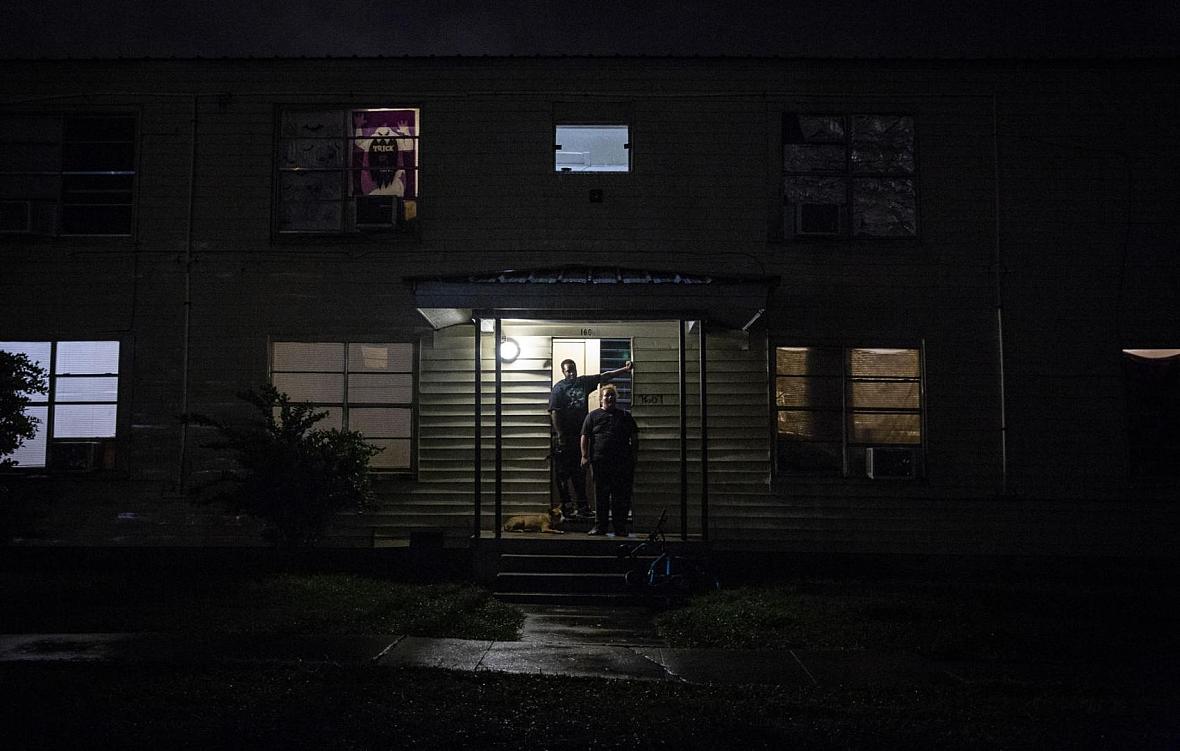
Tristin Gary, 24, and boyfriend Seth Johnson, 30, moved into Crossroads Apartments in late summer with Gary's now-3-year-old daughter, Lirik. The family fled a dangerous neighborhood in Fort Worth to Victoria, where Gary's mother lives.
(Photo Credit: Angela Piazza/Victoria Advocate)
Tristin Gary’s desperate last resort came in the form of a one-room apartment, with just a minifridge, microwave, tiny sink, shower and toilet.
It was all the young mother could afford.
During the summer, Gary, 24, fled south with her toddler and boyfriend from a violent neighborhood in Fort Worth to Victoria, a city of 67,000 people where she thought her small family could build a better life. But roughly one year after Hurricane Harvey, which damaged an estimated one-third of Victoria’s apartments, finding a rental home within budget of her McDonald’s paychecks seemed next to impossible.
Locked out of their apartment, Johnson, Gary, Lirik and their two dogs take refuge from chilly weather in a neighbor’s apartment during the day. Uncertain of where they will sleep at night, Gary sent her daughter to spend the night with her mother. (Photo Credit: Angela Piazza/Victoria Advocate)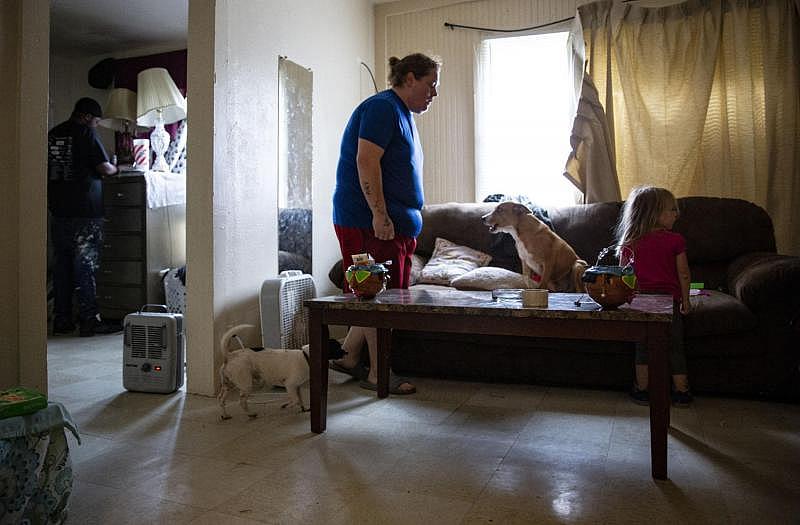
Her only option turned out to be the small room at Crossroads Apartments, a deteriorating complex built in the 1940s. Gary’s unit, where she lived with her daughter, Lirik, was in the same building as two sex offenders, according to state records. When it rained, water seeped through the windows. Cockroaches infested the small space. And often, her family would run into other tenants who were drunk, high, fighting or sometimes passed out in the stairwells, she said.
“Trust me, if I had another place where I could go and move into tomorrow, we would not be here,” said Gary.
This is the harsh reality for families with limited budgets in Victoria, a community that even before the hurricane dealt with exploitative landlords and a shortage of safe, affordable rental housing. Yet in the hurricane’s aftermath, some tenants have little choice but to make do in rentals where they breathe moldy air or sleep in rooms infested with bedbugs and cockroaches. Others, like Gary, find no other option but to move to places like the Crossroads Apartments, where the landlord has been accused of wrongdoings ranging from failing to provide charitable services it claimed on tax documents to wrongfully evicted tenants.
“(Even) when you have mold in your apartment or you live in a substandard apartment, (tenants) don’t want to move because in Victoria, there literally is nowhere else to go,” said Kate Rainey, of Texas RioGrande Legal Aid, who has been examining housing problems in Victoria.
But after Harvey, the state of Texas reserved the vast majority of federal recovery dollars for homeowners – not renters. Of roughly $2.236 billion of federal grant money earmarked to repair damaged housing in areas outside of Houston, about $450 million – roughly 20 percent – is targeted for rentals, according to advocates.
Unless more money is set aside for building new apartments, advocates warn that renters will be forced from communities experiencing housing shortages. Meanwhile, families without financial means to move out could find themselves trapped in units infested with mold, still in disrepair after Harvey or lacking basic necessities like running water.
“Our affordable housing crisis is absolutely going to get exacerbated because of this if we don’t adequately respond to the housing needs,” said Charlie Duncan, research director for the Austin-based Texas Low Income Housing Information Service. “We think the needs of renters are really getting underestimated.”
HOMELESS AFTER HARVEY
When Gary moved to Victoria in late summer, she never imagined that within three months, her family would become homeless – like many others in Harvey’s wake.
With McDonald’s paychecks as her only source of income, Gary knew paying rent on time would be difficult. It was paid by the week, $226 due every Friday, she said. That seemed like a lot for the tiny room, which she shared with her toddler, boyfriend and two dogs – Lucy and Sky, named after The Beatles’ “Lucy in the Sky with Diamonds.”
But once she started falling behind, saving up one month’s rent and deposit for a different place while earning slightly more than minimum wage began to seem as unlikely as her landlord forgiving the rent she already owed.
What Gary didn’t expect though, was for her landlord to put a lock on her door. During the next week, they slept on friends’ couches, trying to scrape up rent money. But one morning, another shock came: Multiple men on golf carts showed up at her apartment, took the lock off the door and shoved all her belongings – clothes, children’s toys and kitchenware – into trash bags. They threw some of it into a dumpster. Then hauled the rest away, to a place Gary didn’t know.
“As a parent … it’s the sh---iest feeling in the world,” said Gary, who ended up homeless. “It makes me want to cry when I think about it because (my daughter) doesn’t really know what’s going on. She’s like, ‘Mama, I want to go inside, I want to go home.’”
“And I have to explain to her, ‘We can’t right now.’”
A Crossroads maintenance worker throws a black garbage bag filled with items he collected from Gary and Johnson’s apartment into a dumpster. The bag was one of several that ended up in the garbage. Without giving Gary an exact time, the crew let themselves into her apartment and cleared all of the family’s belongings out in about an hour. (Photo Credit: Angela Piazza/Victoria Advocate)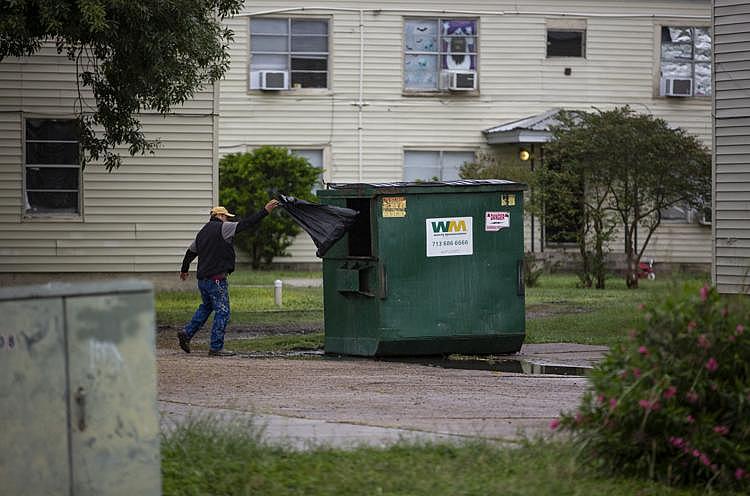
Management at Crossroads Apartments did not return multiple requests for comment. But this is a common story for renters there. Last year, four tenants sued the apartments, accusing their landlord of wrongfully evicting families and taking their belongings when they evacuated during Hurricane Harvey. That’s generally illegal. In Texas, the law requires landlords to give tenants notice and file eviction lawsuits in court before they can kick them out.
These accusations come despite the fact that these apartments are connected with two nonprofits that claimed to provide charity services ranging from soup kitchens to disaster relief to $17.5 million in free and low-income housing over a decade. Yet even after Harvey, local housing advocates said they didn’t know anyone who received shelter.
These are far from the only problems, though. The Crossroads Apartments are also known as a hub for violent crime and drugs: During the past five years, Victoria’s emergency responders were called to the complex almost 3,500 times – roughly once every 12 hours, according to city data.
This is where families trying to climb out of poverty are often stuck alongside criminals if they can’t afford anything else. But even though these apartments are often considered Victoria renters’ rock bottom, they are far from the only ones that have caused problems for tenants.
Even before Hurricane Harvey struck, Victoria dealt with serious housing problems. A city plan approved in 2015 identified at least 185 renter households that lived in substandard housing – defined as a home without hot or cold running water; a flushing toilet; a bathtub or shower; or a kitchen without a sink with running water, a range or stove, or a refrigerator. The report also found 475 renter households living in overcrowded homes, and 2,020 who paid more than 50 percent of their income on rent.
Despite the widespread issues, many tenants avoid reporting problems because they fear landlords’ retaliation – behavior that’s illegal, according to local officials.
During the past three years, Victoria’s health department received at least 19 complaints about problems with rental housing, nearly half of which occurred in the months after Harvey. The complaints ranged from accusations of mobile homes leaking raw sewage to mold infestations to an apartment’s ceiling caving in.
“I’d just heard this morning that a woman was living with mold, and she was scared to say anything because her landlord would evict her if she did,” said Ginny Stafford, who runs Mid-Coast Family Services, a nonprofit that provides rental assistance. “And sure enough, he did – he did evict her because she complained about the hole in the ceiling and the mold in the walls.”
After Harvey, it became clear how many people had been living in dilapidated structures: trailers with no running water, storage sheds or single-rooms without kitchens or bathrooms, explained Stafford.
When those units were damaged, many of their tenants were forced out.
“They were getting by, they were paying $300 to $400 a month, and now there’s nothing for them,” Stafford said. “Hardly an hour goes by that someone here isn’t looking for a place to live because they just can’t afford the regular rent.”
RENTAL CRISIS CROSSES ECONOMIC BOUNDARIES
In Harvey’s wake, renters with extremely limited incomes, like people earning minimum wage or elderly surviving on Social Security, aren’t the only ones struggling. Even tenants with steady incomes and protections that come with traditional leases are squeezed by Victoria’s rental housing shortage.
In the year following Harvey, Victoria’s health department received a few complaints about large apartment complexes, including at least two alleging that mold infested the Autumn Park Apartments, a complex built in the 1980s where at least 17 units were so damaged by Harvey that tenants were forced to move out.
Black mold was evident at an Autumn Park apartment through a hole in the exterior wall Feb. 20, 2018. Some of the apartment buildings in the complex are still unlivable more than a year after Hurricane Harvey. (Photo Credit: Angela Piazza/Victoria Advocate)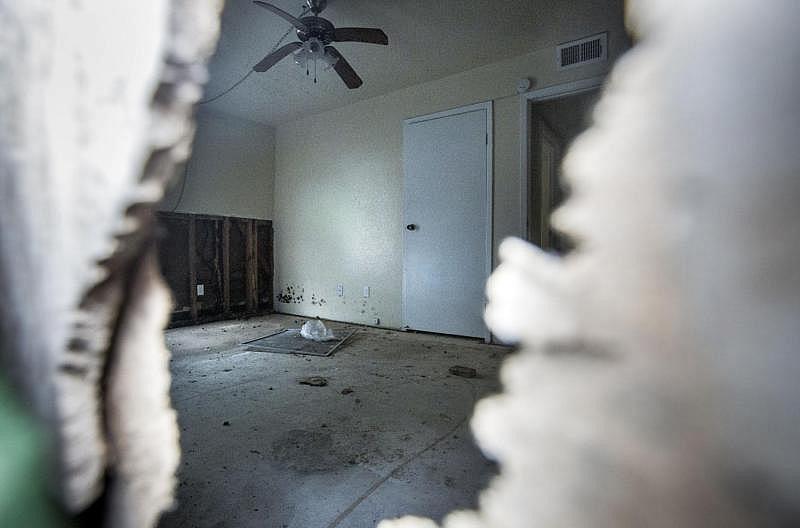
That’s where Teresa Lee has been living with her partner and two young daughters in a unit that always seems to crawl with cockroaches, no matter what they do to kill them. It’s in that apartment where the couple has dealt with hot water getting shut off for days at a time, she said. And where, this fall, Lee discovered that her apartment was swarming with bedbugs, too.
“We had to throw out our box spring, our couch,” she said. “I had never seen a bug infestation like that.”
On a chilly October day, at least two couches, five box springs and six mattresses – including one covered in at least 78 bedbugs – littered the pothole-ridden parking lot at Autumn Park. The mother of two said she wants to move from that complex, but finding another apartment after Harvey is difficult at best, even with steady income from her job at a local daycare.
When asked about the bedbugs, Lee’s landlord said that management inspects all units and gives tenants a form showing how to check for bedbugs before they move in. But if tenants discover the pests once they’re living there, they’re responsible for picking up the bill, said Melissa Moore, property manager of Autumn Park.
“Unfortunately, bedbugs are an epidemic and can show up anywhere, even five-star hotels,” said Moore, adding that management also works quickly to address other problems ranging from mold to outages of hot water.
Moore also serves as president of the Victoria Apartment Association – one of the only agencies in Victoria that serves as a resource for property managers and landlords. It’s the same group that health officials often call when they receive complaints about apartments – because in Victoria, there is no local tenants’ union or additional protections within city code to protect renters.
“Many other states have better protections for tenants,” said Sandy Rollins, who runs the Dallas-based Texas Tenants’ Union. “The Texas Legislature has a lot of catching up to do to protect the people in the state from unfair practices.”
For example, landlords often make tenants like Lee sign bedbug addendums – documents that put tenants on the hook for eradication. But there’s no law requiring landlords to tell new tenants whether bedbugs currently overrun properties. Instead, tenants can end up like Lee, who discovered the pests and suddenly found herself responsible for paying hundreds of dollars to kill them.
Even worse from a health standpoint, landlords don’t have to tell tenants that units were damaged by storms like Harvey. Some landlords may simply paint over mold, which can pose a dangerous threat to health. “Mold is a huge issue in the state,” explained Rollins. “But city (and state) codes don’t deal with it adequately.”
‘ZERO PERCENT IS REALLY GOING TO RENTERS’
Like hundreds of other renters in Victoria, Cindy Barrientes’ family returned after evacuating during Harvey to find they wouldn’t be able to live in their two-bedroom apartment anymore.
Because the housing market was so tight, Barrientes, her husband and their three sons found no other choice but to rent at Crossroads Apartments. The mother, who was pregnant at the time, felt overwhelmed with anxiety knowing that her family lived in a complex notorious for crime and drugs.
Barrientes lifts a curtain to show a broken window. The mother said she attempted to barricade the window with a mattress during Hurricane Harvey, but the winds were too strong. Broken glass, clothing and a water-damaged mattress are scattered across the bedroom floor. (Photo Credit: Angela Piazza/Victoria Advocate)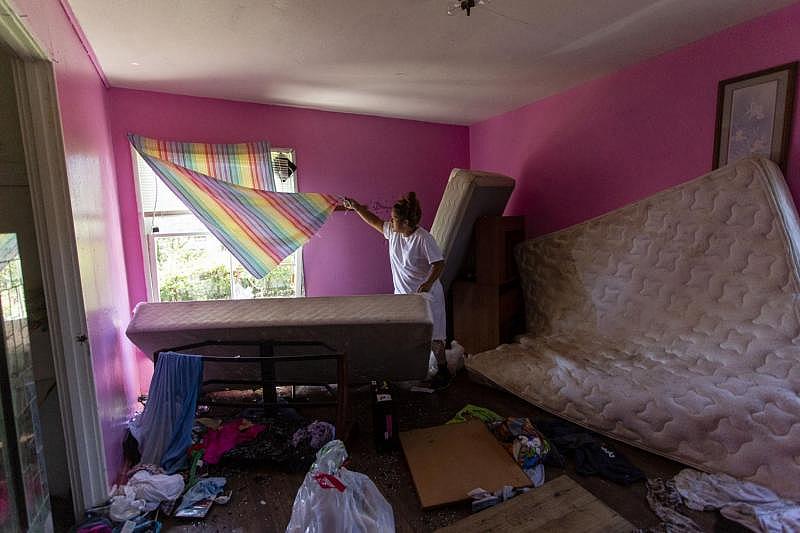
But then her family got lucky: Her husband’s boss at a construction company offered them a rental home within walking distance of her children’s school. Cracks split the walls. Mold lined sections of the ceiling and doorways. But they would make do.
When her family first moved in, they didn’t have furniture. Barrientes vividly remembers how uncomfortable it was sleeping on the floor after delivering her daughter via cesarean section. Eventually, a local nonprofit gave them a bed. Months later though, they still haven’t been able to save up enough to replace everything else.
“It breaks my heart and at times I find myself a lot just locked in my room and just crying,” the mother said. “But you got to stay strong for the kids.”
But for people like Barrientes who rented their homes instead of owning them at the time of Harvey’s landfall, housing advocates warn the help they still desperately need may not come. Amelia Adams, a researcher with the Texas Low Income Housing Information Service, explained that none of the $450 million of federal funding reserved to rebuild rental units is actually going directly into renters’ pockets. “Zero percent is really going to renters themselves – it’s all going to developers and owners of multifamily property,” she said.
Instead of giving cash assistance to renters, the state awards money to property owners and developers so they can rebuild apartments – properties that, in theory, will house South Texans who lost homes to Harvey, Adams explained. But so far, there are major red flags with the state’s plan. No. 1, it doesn’t prioritize projects that promise to serve communities’ most vulnerable renters – people with extremely limited incomes who otherwise can’t afford rent.
Rather than giving priority to projects that serve those renters, applications are generally prioritized on a first-come, first-serve basis, Adams said. Developers just have to promise to serve families whose income falls at 80 percent of the area median – a family of four in Victoria would qualify if they made less than $55,450 in 2018.
But in Victoria, 42 percent of renters who applied for federal assistance after Harvey made less than half that amount, said Adams. Those renters are considered “extremely low-income,” which means a family of four makes less than $25,100 per year. “It’s going to put the rent out of reach for most tenants,” she continued.
Sanchez Salas asks the family if they need more tortillas during dinner. Barrientes sits on the floor and uses steps as a table while Jonathan, Fernando and Nathan eat off the coffee table. Barrientes said typically she eats on the coffee table and Nathan sits on the steps. (Photo Credit: Angela Piazza/Victoria Advocate)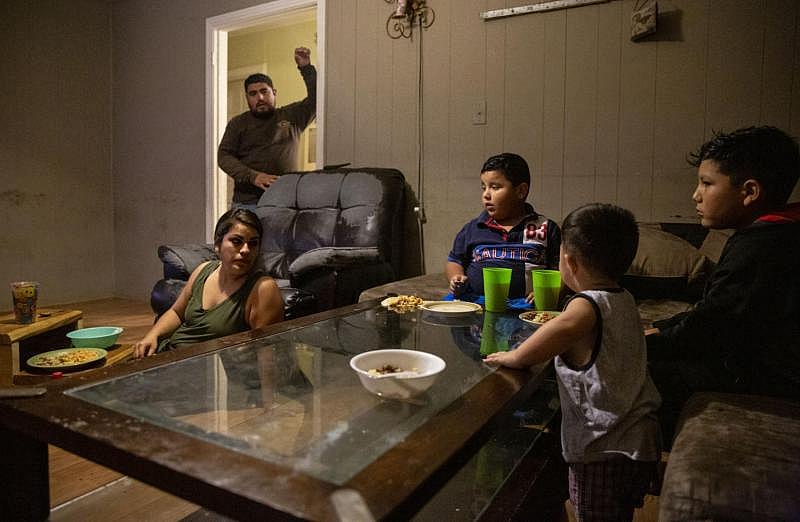
But the Texas General Land Office, the agency overseeing housing programs, said it designed the plan to house displaced tenants as efficiently as possible – and everything was backed with data. When asked about advocates’ criticism that the plan failed to protect vulnerable renters by not prioritizing affordability, GLO spokeswoman Brittany Eck said she heard the opposite argument in some areas; some local officials wanted more flexibility to serve renters with higher incomes, not only ones with extremely low incomes.
“We’re here to implement as quickly and efficiently as possible because there are people outside of housing,” said Eck, who added that more funding was allocated to homeowners than renters because their homes cost more to rebuild per unit than apartments.
Under the current plan, homeowners outside Houston will be able to tap into $1.334 billion set aside for rebuilding their primary homes. Because the state’s plan so drastically favors homeowners rather than renters, advocates say it could open the state to legal challenges.
“We are starting to think about how to bring large-scale litigation against the GLO alleging that its lack of focus on renters is discriminatory because renters are likely to be more African-American and Hispanic compared to homeowners, which are more white,” said Rainey of Texas RioGrande Legal Aid, which works closely with Adams’ group.
Housing discrimination is illegal, but the argument against the state is a messy one because private landlords aren’t required to track tenants’ race. That means it’s difficult to know how many renters of color didn’t receive the help they needed after Harvey, Rainey said.
No one knows exactly how many families, like Barrientes’, are still struggling to replace what Harvey destroyed. Or how many rental homes have yet to be repaired. But unless something changes, advocates say it’s clear the situation for renters will gravely worsen in Harvey’s aftermath.
BUS TICKET OFFERS HOPE
After the men cleared out her apartment in mid-October, Gary, her boyfriend and daughter shuffled between friends’ couches. Sometimes, they stayed with Gary’s mother, who works in construction and sleeps in the homes that she renovates. On four occasions, the small family found themselves sleeping outside, just as temperatures dropped sharply from the 70s to upper 40s. The family’s blankets and jackets, however, were still locked away by their ex-landlord.
The spiral of chaos that swallowed up Gary’s apartment, belongings and sense of stability also cost the mother her job at McDonald’s. “I’m not going to go to work knowing that my kid is out on the street,” she explained.
She knew she had to get away, if only to protect her daughter. Away from the city where there isn’t an emergency shelter for families. Away from Victoria, where the City Council has largely ignored rental housing problems in Harvey’s wake.
Gary made the sacrifice most mothers would: Leave everything else behind, even her own mother, boyfriend and two dogs, to build a better life for her child. With just $20 to her name, she packed all their belongings in two backpacks. A local soup kitchen and church pitched in $352 to buy two Greyhound bus tickets to Abilene. One for Gary, one for her daughter. They also gave her a coat for the little girl, peanut butter crackers, granola bars and raisins for the 14-hour journey.
When the time came to leave, Gary arrived five hours early to the bus stop, a parking lot outside a gas station on the edge of town. Inside the convenience store, she pushed two chairs together so her daughter could sleep as they waited. She picked the 3:20 a.m. bus so she would arrive in Abilene after 5 p.m., when her cousin would be off work and could pick her up. From there, they would drive 45 minutes to Cisco, a town of 3,800 people where Gary grew up.
“I told everyone, ‘I’m never moving back to this town,” she recalls her younger self saying. But when her cousin offered her a place to stay, Cisco didn’t seem like a bad option anymore. Unlike Victoria, there wasn’t a long wait to get an affordable apartment, she was told. And in less than four days, she would start a job at a restaurant owned by her aunt.
Gary watches Lirik sleep on two chairs pushed together inside a convenience store and bus station while waiting for their Greyhound. Having to rely on a friend to give them a ride to the station, they waited about six hours in the store for their 3:20 a.m. bus to arrive. (Photo Credit: Angela Piazza/Victoria Advocate)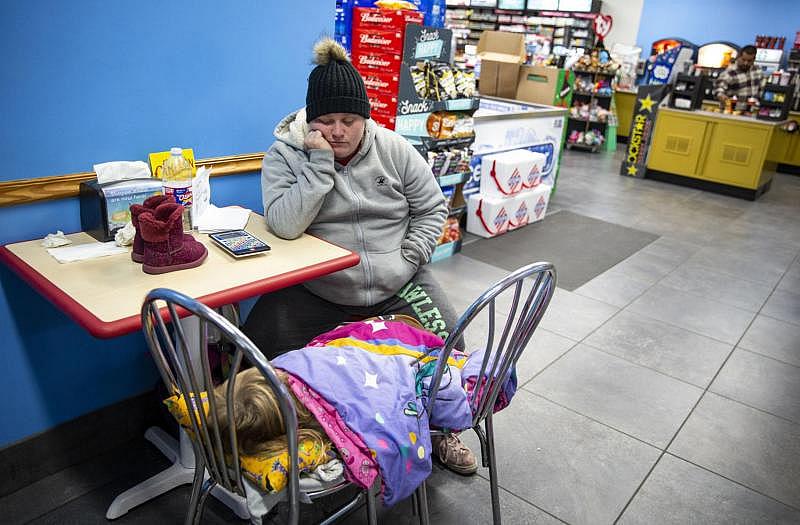
At 2:56 a.m., Gary woke up her daughter, bundled in a blanket, and led her outside to the bus stop where the cold air reeked of gasoline. The 3-year-old whimpered and motioned to her mother to pick her up. Soon, Gary’s arms started to ache, but she wasn’t going to let her daughter down. Not now and not in the future.
After 30 minutes of waiting in 36-degree weather in just a hoodie and sweatpants, Gary finally could see the lights of the bus. “See that big ol’ bus?” she told her daughter. “We’re going home!”
The Greyhound bus had arrived.
[This story was originally published by Victoria Advocate.]

